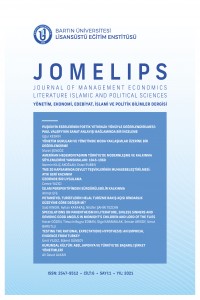Abstract
Rasyonel beklentiler hipotezine göre, ekonomik birimler mevcut tüm bilgiyi etkin şekilde kullanarak gelecekle ilgili doğru tahminlerde bulunurlar. Hipoteze göre ekonomik birimler hatalı tahminlerde bulunsalar dahi, mevcut bilgiyi kullanarak yapılan hatayı düzeltmeye yönelik beklentilerini şekillendirirler ve bu şekilde sistematik hata yapmazlar.
Bu çalışmada Türkiye için rasyonel beklentiler hipotezinin geçerliliği enflasyon beklentileri özelinde test edilmiştir. Bu kapsamda çalışmada fiyatla ilgili beklentilerin yansızlığı ve etkinliği incelenerek beklentilerin rasyonel olup olmadığı incelenmektedir. Çalışmanın bulgularına göre, enflasyon beklentileri için etkinlik hipotezi kabul edilirken, beklentilerin yansızlığı hipotezi reddedilmektedir. Bu durum, mevcut bilgilerin kullanılıyor olmasına rağmen ekonomik birimlerin doğru tahminler yapamadığını ima etmektedir. Bu nedenle Türkiye için enflasyon beklentilerine ilişkin rasyonel beklentiler hipotezi reddedilmektedir. Ancak sonuçlar, beklentilerin yanlı olmasına rağmen, profesyonel tahmincilerin enflasyonu tahmin ederken birçok değişkeni dikkate aldığını da göstermektedir. Bu ise beklentilerin dikkate alınması durumunda, ekonomi politikalarının uygulanmasında politikaların kısmen etkili olabileceği anlamına gelmektedir.
References
- Bakhshi, H., Kapetanios, G. & Yates, T. (2005). Rational Expectations and Fixed-Event Forecast: An Application to UK Inflation. Emprical Economics 30:539-553.
- Baltagi, B.H. (2008). Econometrics, 4 edn. Germany: Springer.
- Begg, D.K.H. (1982). The Rational Expectations Revolutin in Macroeconomics, Theories and Evidence. Baltimore: The Johns Hopkins University Press.
- Bilgili, F. (2001). The Unbiasedness and Efficiency Tests of The Rational Expectations Hypothesis. MPRA No: 24114.
- Carlson, J.A. (1977). A Study of Price Forecasts. Annals of Economic. and Social Measurement 6(1):27-56.
- Figlewski, S. & Watchel, P. (1981). The Formation of İnflationary Expectations. The Review of Economics and Statistics 58(1):1-10.
- Fisher, P. (1992). Rational Expectations in Macroeconomics Models. London: Kluwer Academic Publishers.
- Forsells, M. & Kenny, G. (2002). The Rationality of Consumers’ Inflation Expectations: Survey-Based Evidence for The Euro Area. European Central Bank Working Paper Series No:163.
- Friedman, B.M. (1980). Survey Evidence on The Rationality of Interest Rate Expectations. The Journal of Monetary Economics 6:453-465.
- Hill, R.C., Griffiths, W.E. & Lim, G.C. (2008). Principles of Econometrics, 3 edn. NJ: Wiley
- Jeong, J. & Maddala, G.S. (1991). Measurement Errors and Tests For Rationality. Journal of Business and Economic Statistics 9(4):431-439.
- Jonsson, T. & Österholm, P. (2012). The Properties of Survey-Based Inflation Expectations in Sweden. Emprical Economics 42:79-94.
- Kara, H. & Küçük Tuğer, H. (2005). Some Evidence on the (Ir)rationality of Inflation Expectations in Turkey. The Central Bank of the Rebuplic of Turkey Working Paper No: 05/12.
- Keane, M.P. & Runkle, D.E. (1989). Are Economic Forecasts Rational? Federal Reserve Bank of Minneapolis Ouarterly Review 13(2):26-33.
- Lyziak, T. (2003). Consumer Inflation Expectations in Poland. European Central Bank Working Paper Series No:287.
- Maddala, G.S. (1992). Introduction to Econometics, 2 edn. New York: MacMillan Publishing Company.
- Mehra, Y.P. (2002). Survey Measures of Expected Inflation: Revisiting The Issues of Predictive Content of Rationality. Federal Reserve Bank of RichmondEconomic Quarterly 88(3):17-36.
- Mishkin, F.S. (1983). A Rational Expectations Approach to Macroeconometrics, Testing Policy Ineffectiveness and Efficient – Markets Models. Chicago: The University of Chicago Press.
- Mullineaux, D.J. (1978). On Testing for Rationality: Another Look At The Livingston Price Expectations Data. Journal of Political Economy 86(2):329-336.
- Muth, J. (1961). Rational Expectations and The Theory of Price Movements. Econometrica 29(3):315-335.
- Nielsen, H. (2003). Inflation Expectations in The EU-Rational. In Eighth Spring Meeting of Young Economists. Belgium: Catholic University of Leuven.
- Oral, E. (2002). Inflation Expectations Derived From Business Tendency Survey of The Central Bank. The Central Bank of the Republic of Turkey Working Paper.
- Pearce, D.K. (1979). Comparing Survey and Rational Measures of Expected Inflation. Journal of Money, Credit and Banking 11(4):447-456.
- Pesando, J.E. (1975). A Note Rationality of The Livingston Price Expectations. Journal of Political Economy 83(4):849-858.
- Razzak, W.A. (1997). Testing the rationality of the National Bank of New Zealand’s survey data. Reserve Bank of New Zealand Discussion Paper 97(5):1-24.
- Riaz, M. (2012). Forecast Analysis of Food Price Inflation in Pakistan: Applying Rationality Criterion for VAR Forecast. Developing Countires Studies 2(1):63-72.
- Snowdon, B & Vane, H.R. (2005). Modern Macroeconomics: Its Origins, Development and Current State. Edward Elgar Publishing.
- Soybilen, B. & Yazgan, E. (2017). An Evaluation of Inflation Expectations in Turkey. Central Bank Review 17:31-38.
- Thomas, L.B. (1999). Survey Measures of Expected U.S. Inflation. Journal of Economic Perspectives 13:125-144.
- Turnovsky, S.J. (1970). Emprical Evidence on The Formation of Price Expectations. Journal of American Statistics Association 65:1441-1454.
- Uygur, E. (1983). Neoklasik Makroiktisat Ve Fiyat Bekleyişleri, Kuram Ve Türkiye Ekonomisine Uygulama. Ankara: Ankara University, Faculty of Political Sciences Publications.
- http://www.tcmb.gov.tr/wps/wcm/connect/EN/TCMB+EN/Main+Menu/Statistics/Tendency+Surveys/Survey+of+Expectations/ Date accessed: 10/03/2018
- https://www.philadelphiafed.org/research-and-data/real-time-center/livingston-survey Date Accessed: 18/04/2017
Abstract
The rational expectations hypothesis suggests that economic agents make accurate forecasts about the future using all available information effectively. According to the hypothesis, even if the economic agents make incorrect estimates, they shape the expectations for correcting the error made using the available information and do not make systematic errors.
In this study, the validity of the rational expectations hypothesis for Turkey, using expectations of the inflation rates, is tested. In this context, it is examined whether the expectations are rational or not by examining the unbiasedness and the efficiency of the expectations about the price. According to results, while the efficiency hypothesis is accepted for the expectations of inflation, the unbiasedness for expectations is rejected in the study. This means that although the current information is being used, economic agents can not make the accurate forecasts. Thus, the rational expectations hypothesis for inlation expectations for Turkey is rejected. However, results also show that although the expectations are biased, professional forecasters take into account many variables while forecasting the inflation. This implies that policies can be partially effective if expectations are taken into account in the implementation of economic policies.
References
- Bakhshi, H., Kapetanios, G. & Yates, T. (2005). Rational Expectations and Fixed-Event Forecast: An Application to UK Inflation. Emprical Economics 30:539-553.
- Baltagi, B.H. (2008). Econometrics, 4 edn. Germany: Springer.
- Begg, D.K.H. (1982). The Rational Expectations Revolutin in Macroeconomics, Theories and Evidence. Baltimore: The Johns Hopkins University Press.
- Bilgili, F. (2001). The Unbiasedness and Efficiency Tests of The Rational Expectations Hypothesis. MPRA No: 24114.
- Carlson, J.A. (1977). A Study of Price Forecasts. Annals of Economic. and Social Measurement 6(1):27-56.
- Figlewski, S. & Watchel, P. (1981). The Formation of İnflationary Expectations. The Review of Economics and Statistics 58(1):1-10.
- Fisher, P. (1992). Rational Expectations in Macroeconomics Models. London: Kluwer Academic Publishers.
- Forsells, M. & Kenny, G. (2002). The Rationality of Consumers’ Inflation Expectations: Survey-Based Evidence for The Euro Area. European Central Bank Working Paper Series No:163.
- Friedman, B.M. (1980). Survey Evidence on The Rationality of Interest Rate Expectations. The Journal of Monetary Economics 6:453-465.
- Hill, R.C., Griffiths, W.E. & Lim, G.C. (2008). Principles of Econometrics, 3 edn. NJ: Wiley
- Jeong, J. & Maddala, G.S. (1991). Measurement Errors and Tests For Rationality. Journal of Business and Economic Statistics 9(4):431-439.
- Jonsson, T. & Österholm, P. (2012). The Properties of Survey-Based Inflation Expectations in Sweden. Emprical Economics 42:79-94.
- Kara, H. & Küçük Tuğer, H. (2005). Some Evidence on the (Ir)rationality of Inflation Expectations in Turkey. The Central Bank of the Rebuplic of Turkey Working Paper No: 05/12.
- Keane, M.P. & Runkle, D.E. (1989). Are Economic Forecasts Rational? Federal Reserve Bank of Minneapolis Ouarterly Review 13(2):26-33.
- Lyziak, T. (2003). Consumer Inflation Expectations in Poland. European Central Bank Working Paper Series No:287.
- Maddala, G.S. (1992). Introduction to Econometics, 2 edn. New York: MacMillan Publishing Company.
- Mehra, Y.P. (2002). Survey Measures of Expected Inflation: Revisiting The Issues of Predictive Content of Rationality. Federal Reserve Bank of RichmondEconomic Quarterly 88(3):17-36.
- Mishkin, F.S. (1983). A Rational Expectations Approach to Macroeconometrics, Testing Policy Ineffectiveness and Efficient – Markets Models. Chicago: The University of Chicago Press.
- Mullineaux, D.J. (1978). On Testing for Rationality: Another Look At The Livingston Price Expectations Data. Journal of Political Economy 86(2):329-336.
- Muth, J. (1961). Rational Expectations and The Theory of Price Movements. Econometrica 29(3):315-335.
- Nielsen, H. (2003). Inflation Expectations in The EU-Rational. In Eighth Spring Meeting of Young Economists. Belgium: Catholic University of Leuven.
- Oral, E. (2002). Inflation Expectations Derived From Business Tendency Survey of The Central Bank. The Central Bank of the Republic of Turkey Working Paper.
- Pearce, D.K. (1979). Comparing Survey and Rational Measures of Expected Inflation. Journal of Money, Credit and Banking 11(4):447-456.
- Pesando, J.E. (1975). A Note Rationality of The Livingston Price Expectations. Journal of Political Economy 83(4):849-858.
- Razzak, W.A. (1997). Testing the rationality of the National Bank of New Zealand’s survey data. Reserve Bank of New Zealand Discussion Paper 97(5):1-24.
- Riaz, M. (2012). Forecast Analysis of Food Price Inflation in Pakistan: Applying Rationality Criterion for VAR Forecast. Developing Countires Studies 2(1):63-72.
- Snowdon, B & Vane, H.R. (2005). Modern Macroeconomics: Its Origins, Development and Current State. Edward Elgar Publishing.
- Soybilen, B. & Yazgan, E. (2017). An Evaluation of Inflation Expectations in Turkey. Central Bank Review 17:31-38.
- Thomas, L.B. (1999). Survey Measures of Expected U.S. Inflation. Journal of Economic Perspectives 13:125-144.
- Turnovsky, S.J. (1970). Emprical Evidence on The Formation of Price Expectations. Journal of American Statistics Association 65:1441-1454.
- Uygur, E. (1983). Neoklasik Makroiktisat Ve Fiyat Bekleyişleri, Kuram Ve Türkiye Ekonomisine Uygulama. Ankara: Ankara University, Faculty of Political Sciences Publications.
- http://www.tcmb.gov.tr/wps/wcm/connect/EN/TCMB+EN/Main+Menu/Statistics/Tendency+Surveys/Survey+of+Expectations/ Date accessed: 10/03/2018
- https://www.philadelphiafed.org/research-and-data/real-time-center/livingston-survey Date Accessed: 18/04/2017
Details
| Primary Language | English |
|---|---|
| Journal Section | Research Article |
| Authors | |
| Publication Date | July 2, 2021 |
| Submission Date | January 24, 2021 |
| Published in Issue | Year 2021 Volume: 6 Issue: 1 |
Papers are controlled by the Ithenticate program against plagiarism
All published articles have the DOI number.
 JOMELIPS is licensed under a Creative Commons Attribution-NonCommercial-ShareAlike 4.0
International (CC BY-NC-SA 4.0)https://creativecommons.org/licenses/by-nc-sa/4.0/
JOMELIPS is licensed under a Creative Commons Attribution-NonCommercial-ShareAlike 4.0
International (CC BY-NC-SA 4.0)https://creativecommons.org/licenses/by-nc-sa/4.0/
.

